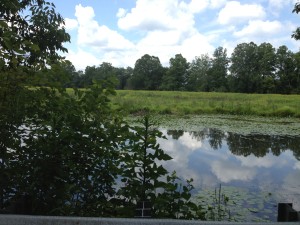New offshoot will focus on watershed restoration

At the Stroud Water Research Center, keeping waterways like the Brandywine Creek clean is an ongoing goal.
Innovation continues to percolate at the Stroud Water Research Center, which on Thursday announced the launch of the Watershed Restoration Group to develop, research, implement, and monitor restoration projects throughout Pennsylvania and beyond.
Matthew Ehrhart, former Pennsylvania executive director of the Chesapeake Bay Foundation (CBF), is heading the group; David Wise, also formerly of CBF, will serve as the watershed restoration manager. Ehrhart and Wise have spent much of their careers advancing stewardship of streams in the region, particularly by helping farms implement conservation measures, said a Stroud news release.
Ehrhart holds a master’s in engineering degree from Penn State’s Engineering Science Program. After working as an environmental scientist for LandStudies, Inc., he worked as a watershed restoration consultant before joining CBF, where, as executive director, he was responsible for overseeing a multimillion-dollar agricultural restoration initiative in Pennsylvania, the release said.
Wise received his master’s degree in land resources from the University of Wisconsin-Madison Institute for Environmental Studies. After serving as an environmental science instructor at Lancaster Mennonite High School, he joined CBF — first as a biologist and then as the Pennsylvania watershed restoration program manager, according to the release.
“Our research, which spans over four decades, has taught us a lot about restoring streams and rivers,” said Bernard Sweeney, the center’s director. “We share what we learn with the public through our education programs. Now we’re doubling that effort, using our research to create infrastructure to shape a brighter future for our water.”
The Watershed Restoration Group has already secured three grants, the release said. One is provided through the National Fish and Wildlife Foundation (NFWF), with funding from the U.S. Environmental Protection Agency (EPA), the USDA Natural Resources Conservation Service, and Altria Group. It will facilitate allow a project to help farmers address common water quality. Partners include more than a dozen public agencies and private groups; an estimated 27 farms in Lancaster and surrounding counties will participate.
A companion grant, provided by the state Department of Environmental Protection’s Growing Greener Program, will expand these efforts to additional farms to address water quality impairments.
Another project, supported by a grant from NFWF, with funding from the EPA and U.S. Forest Service, will demonstrate low-cost alternatives to existing buffer reforestation methods, which can be expensive and have shown mixed results. Methods to be demonstrated include natural regeneration, direct seeding, and live staking.
For more information about the Stroud Water Research Center, an independent, 501(c)(3), visit www.stroudcenter.org.







